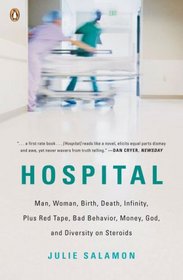Madge C. (dmconn1) reviewed Hospital: Man, Woman, Birth, Death, Infinity, Plus Red Tape, Bad Behavior, Money, God, and Diversity on Steroids on + 234 more book reviews
Helpful Score: 1
Julie Salamon immersed herself in an inner city hospital, Maimonides (in Brooklyn), for a year to discover what makes this multi-cultural medical complex run. Details are abundant as she writes about her experiences, and explorations of the politics that are abundant in this institution. She writes about real life experiences that mimic some of the hospital drama TV shows, but delves deeper into the relationships that form and clash in the fast paced environment of Maimonides. There were sections of the book that were quite stagnant for me, while other pages flew by without a blink. Anyone in the health care system would probably find the book enthralling and titillating. If you are interested in the inner machinations of an inner city hospital, and enjoy reading about the egos of some of the physicians and administrators, you will certainly want to pick up this book.
Helpful Score: 1
Dry and boring. I guess I was expecting a little more case studies and more patient-doctor interaction but instead this is mostly about the people who run a hospital and how it is run. Not what I was expecting at all. If you are looking for a book about the ins and outs of hospital administration, this would be a good book. Not what I was looking for, though.
Helpful Score: 1
After almost 100 pages, I still cannot figure out the thesis of this book. It reads like a 300-page profile piece from the NYT, without a clear protagonist or antagonist. Is this a story about a good hospital? A bad one? Should I like these people? Should I hold them up as example of problems in the system? Are there really even problems in the system, or is this the best we can hope for? The author leaves me feeling indifferent about all of it, and ultimately this book too.




![header=[] body=[Get a free book credit right now by joining the club and listing 5 books you have and are willing to share with other members!] Help icon](/images/question.gif?v=2c6bf199)
